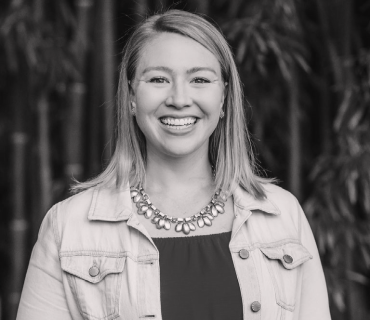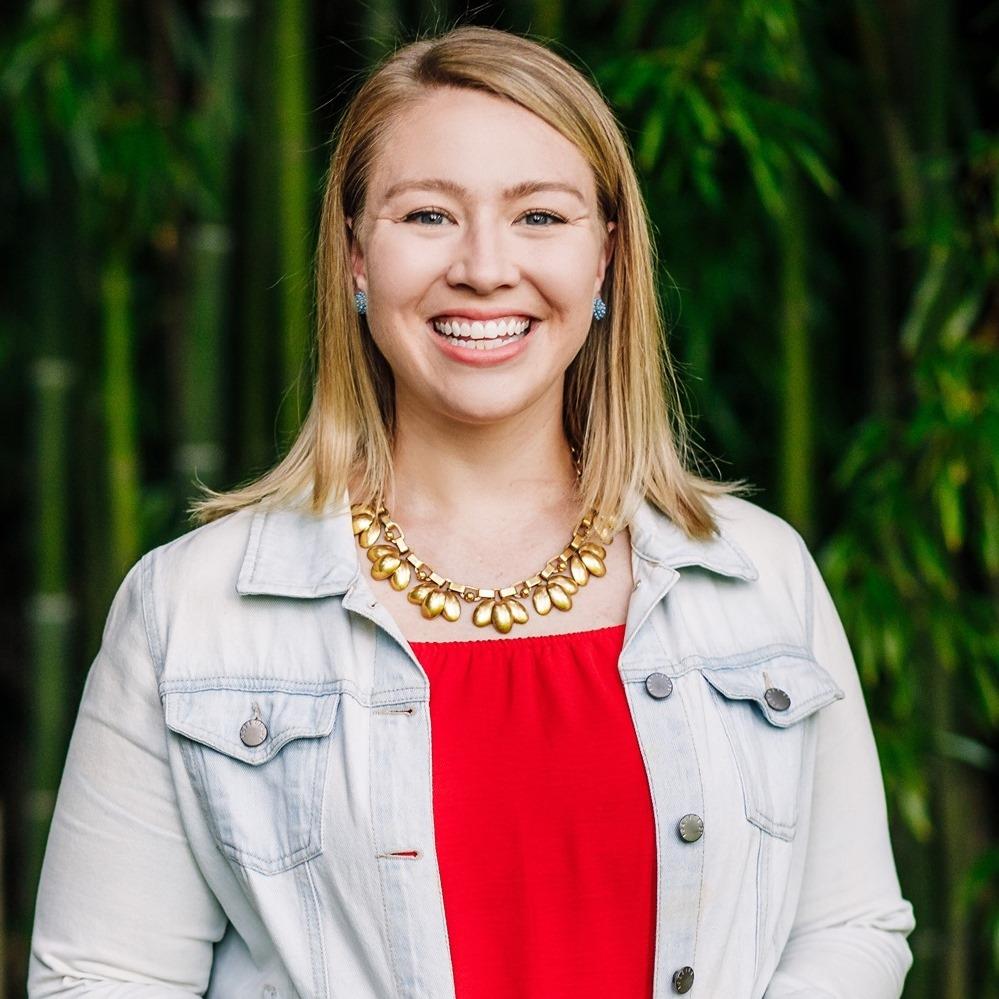What is a current challenge you are dealing with?
I just got done meeting with the new long-term substitute at our school. Our school’s other computer science teacher resigned, so we’re in the process of figuring out what that plan looks like for the rest of the year.
How do you feel about going to teach back in person?
As I’m pregnant, I can stay home and teach virtually. I’m bummed as I look forward to teaching in-person and being able to get live feedback from kids. This has been so difficult.
What has your path to CS looked like?
My approach has been nonlinear, but that has been an advantage for me as a teacher. As a high school student, I took a freshman-level CS course my senior year, which I had put off because I had initial anxiety that I would fail. My major was political science in college, but I ended up taking 30 credit hours of higher-level math and computer science courses. Once I got to college, I realized that I missed taking CS courses. After graduation, I took a role as a consultant for my sorority, and I think it set me up to not be happy within a more traditional job role. Every day in that role was both challenging and fulfilling, and I got to visit college campuses all over the country where I helped grow student leaders. The years after were a mix of various positions, including a boring stint working at Lululemon. What was a turning point for me was working at a healthcare tech company; I found myself crying in my car at lunch. I was bored and unfulfilled. This led me to work with a career coach, who pointed out how much I loved volunteering as a coach for Girls on the Run. This reflection, along with support from my parents, prompted me to go back to school for teaching. I took a job subbing and took classes at Anne Arundel Community College. I was hired mid-year at a school where, of all things, I taught woodshop! There was an opening for a CS role the following year, and I took it.
What advantages are there for having a nonlinear career path?
While it’s essential to understand the content of your classes, honestly, great CS teachers are vulnerable and model failure alongside their students. Having started teaching CS later, I’m definitely more appreciative of the job, and consistently open to feedback.
How would you define success for your students?
At a high level, my goal for every student I work with is to make their first CS experience great. Success helps support a system that reaches students before getting into college, and research tells us that particularly for girls and other underrepresented groups, taking a CS course before college makes them more likely to take courses later.
To me, success in teaching CS is two-fold:
-
First, I need to actively support and extend opportunities for underrepresented students.
-
Next, a student’s first experience with CS should be successful and impactful; it’s more than just having courses available. As teachers, we need to provide opportunities for students to be successful.
When I first started teaching at my current school in suburban Maryland, our district offered two sections of CS for all students, and there were only about 60 students out of thousands that were enrolled in the most basic CS course. It was obvious when I first got to my school that our students were interested in these courses, but it was about expanding the classes and making them available. This year we have seven sections of CS available for students, including sections of both AP CS Principles and AP CS A.
Success is also about intentional growth: What am I doing to expand our offerings? How am I implementing research-based practices that support girls and underrepresented groups? How am I focused on student understanding and catering to their goals? What am I doing to actively recruit students to take CS?
You are very involved in CSTA; how are you balancing volunteer work and working?
It comes down to clear boundaries, which are complicated for teachers to set. Teachers are sold this idea that to be a great teacher, you should be saying “yes” to everything, stay late hours, and always be available. I did this early on, and all I did was work. I’ve since realized that I was doing that because I felt that if I didn’t do it, then the kids wouldn’t have different experiences. In reality, that is a super selfish way to think about it. When you say “yes” to things that you either don’t really have the time for or you don’t really want to do, you may be taking that opportunity away from someone else. When you are burnt out, you’re not able to serve kids the best you can. You’re not able to be as present for your students because you’re not at your best. You have to say no to some things to be 100% present. For me, the solution has been to ask myself whether new opportunities align with my values and long-term goals, which definitely includes opportunities with CSTA for me. As a general rule, I try to only take on projects that are a “Hell Yes!” – If it’s not a “Hell Yes!,” it’s a no. From there, it’s really about being thoughtful of the systems you have in place so that you can be both efficient and effective.
Can you talk about what systems you have in place to guard your time?
I try to systemize the more repetitive parts of my job. For example, I only do grading on Wednesday, when I know my creative energy is lower due to having a lot of meetings. I follow the same process every time. This is an example of being really intentional with my schedule. On Sundays, I write down everything I need to get done for the week, and I batch out my work based on my schedule for the week. For example, Tuesdays are more open with fewer meetings, so I block more creative tasks for Tuesdays. As a teacher, we have all of these little tasks we have to accomplish throughout the week, so I get through those during pockets of time where I may only have 10-15 minutes available. I’m constantly iterating, though, and I think about what systems I can create to streamline the work: What tasks can I automate? A lot of my work management strategies come from being a certified ScrumMaster, which has taught me that you don’t have to sacrifice effectiveness to be efficient: you can have both.
On your Twitter, you talk about teachers getting compensated for their time/work. Can you talk about how teachers should advocate for themselves?
If you are asked to do something outside your job description, it is an opportunity to get compensated. Start by documenting what you are being asked to do. Then, do your research: are people getting paid for what you’re being asked to do? Whether it’s leading PD for your district or a tech company asking to “pick your brain,” you deserve to be paid for your expertise and time. An excellent (and easy!) follow-up for someone asking for your time is, “thanks for reaching out. I’d love to work on this project as a consultant; here is my hourly rate.” At the school or district level, if you’re not able to be monetarily compensated for time, consider asking for compensation in other ways. This might include getting time back in your schedule: could you come in later on some days? Could you skip that faculty meeting, or leave with the kids a few days? If you need to perform an additional 20 hours a week to support and meet your student’s needs, that is not sustainable. I know teachers sometimes feel like if we don’t do all of this extra work, we’re letting kids down. But it’s not you letting your kids down, it’s a system that relies on the unpaid labor of teachers. It shouldn’t be up to us to be martyrs to fix the system.
How have you pivoted when something wasn’t working well with online teaching?
The first thing in my teaching is that everything needs to be interactive. I am continually asking for feedback from kids. Are you getting the resources you need to succeed? What can I do differently? What’s different about this year is we are all experiencing this type of teaching and learning for the first time. It’s a great year to be completely vulnerable – ask your students to tell you what is not working. My current challenge is keeping up with the course content for my AP classes. I’m finding that student goals have changed due to the pandemic of taking these classes. Some students may no longer want to take the AP exam, but rather are just trying to pass the course. Others are relying on scoring well enough on the exam to reduce college costs. How do you effectively teach in a way that acknowledges both of those goals?
Who has been a woman that has inspired you?
I have two, and it’s going to sound cheesy, but I’m really inspired by my mom and my sister.
My mom: she grew up in poverty, went to community college, and then joined the Navy, where she built a successful career. She’s always showcased that you can both build your career and be fully present as a mom. That you don’t have to choose. I’ve always admired her for that, and now that I’m moving into this phase of having children, it’s even more meaningful because I recognize that my work is and can continue to be important to me.
My sister is a big data engineer and has spent a lot of time being the only female in the room. I admire that she is successful not just as a woman but successful in general. She recognizes that the work that she does is bigger than just herself: every day, she’s changing the opinion of men around her. I hear stories firsthand of things that she goes through- how tough it is sometimes it is to be a woman in tech – and it makes our work towards growing representation in CS Ed that much more important.
Resources:

 Jen Manly is a Computer Science Master Teacher with the Terrapin Teachers program at the University of Maryland. In this role, she teaches computer science at both the high school and college levels. In addition, she is a speaker and facilitator, and has presented on topics in CS education at the local, state, and national level, including CSTA, ISTE, ITEEA, and more.
Jen Manly is a Computer Science Master Teacher with the Terrapin Teachers program at the University of Maryland. In this role, she teaches computer science at both the high school and college levels. In addition, she is a speaker and facilitator, and has presented on topics in CS education at the local, state, and national level, including CSTA, ISTE, ITEEA, and more.


